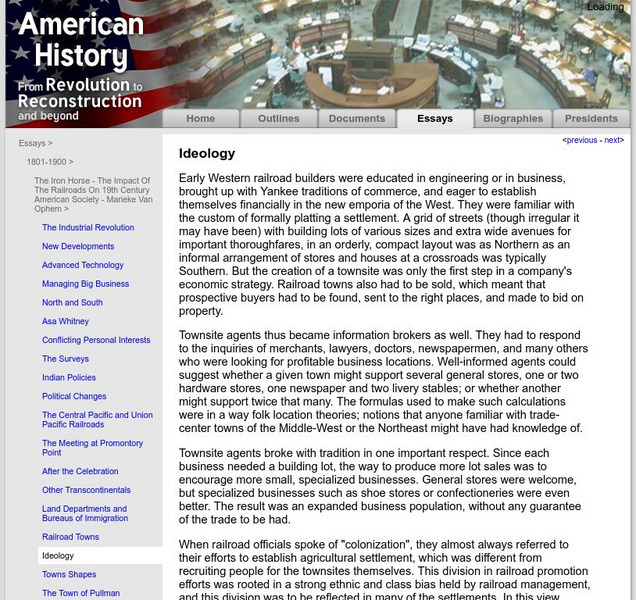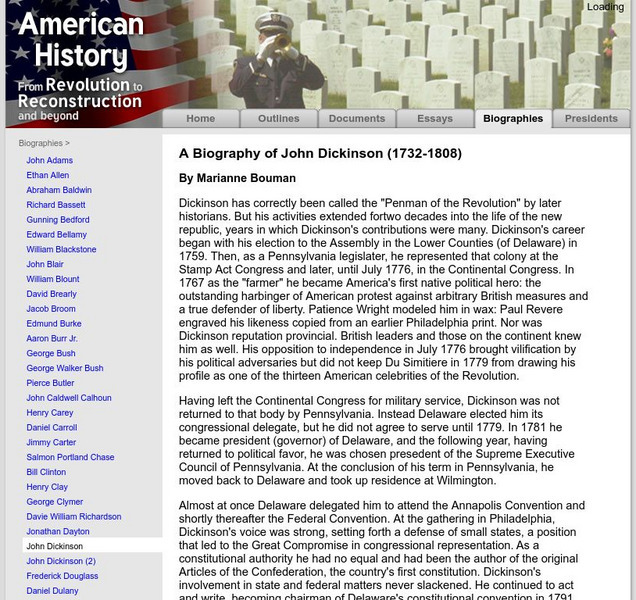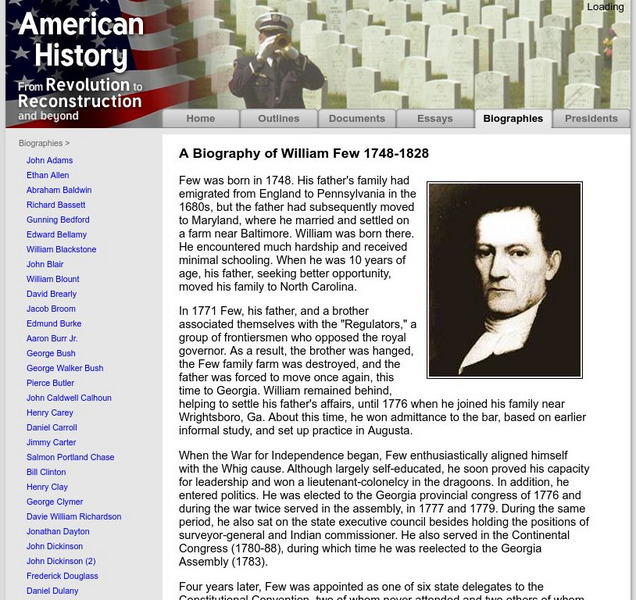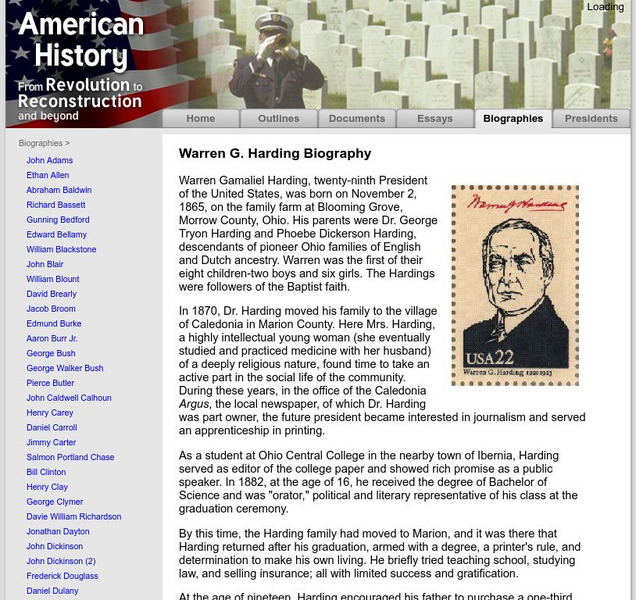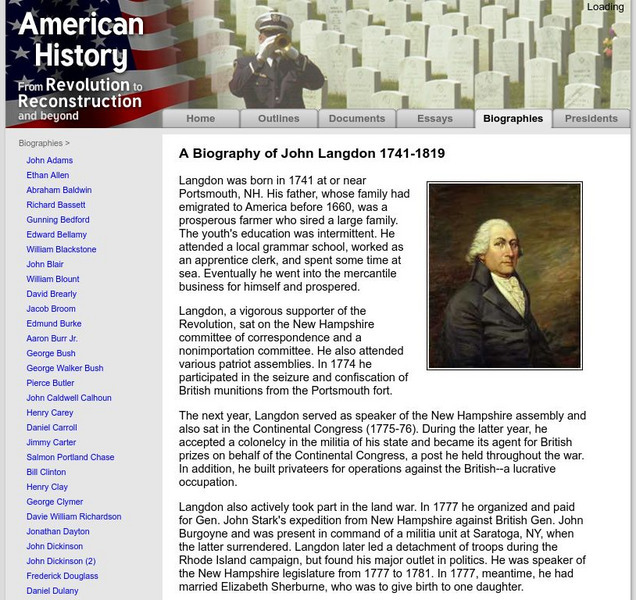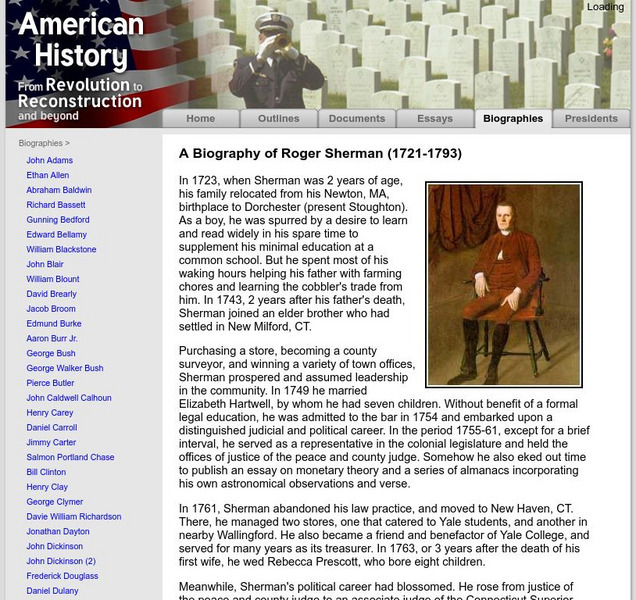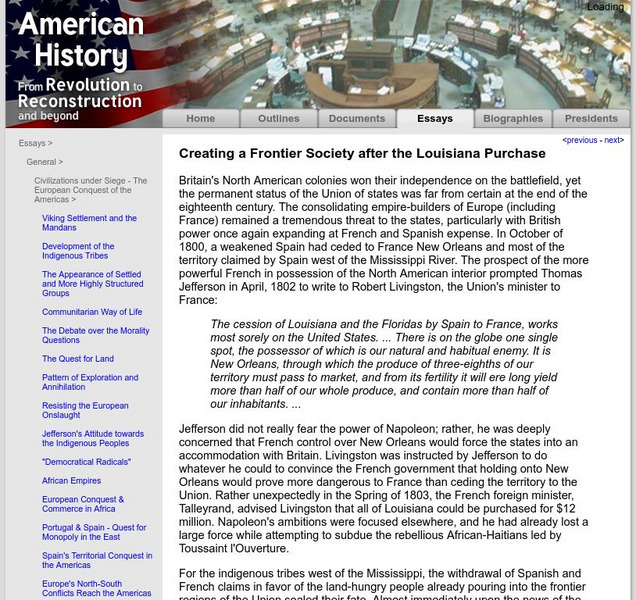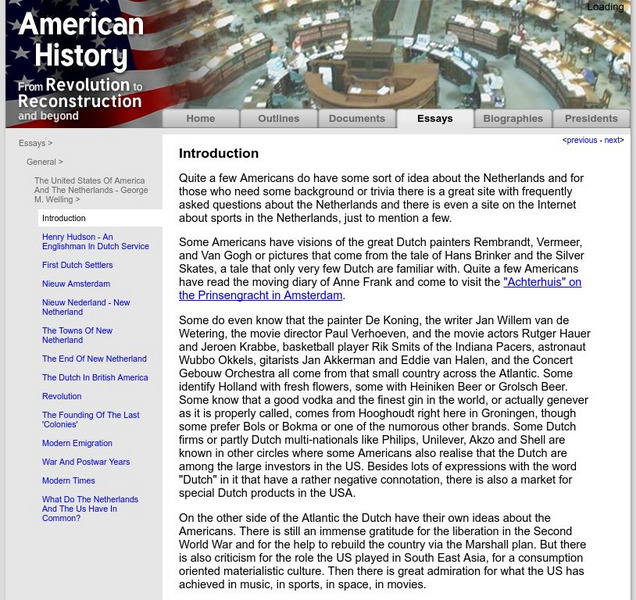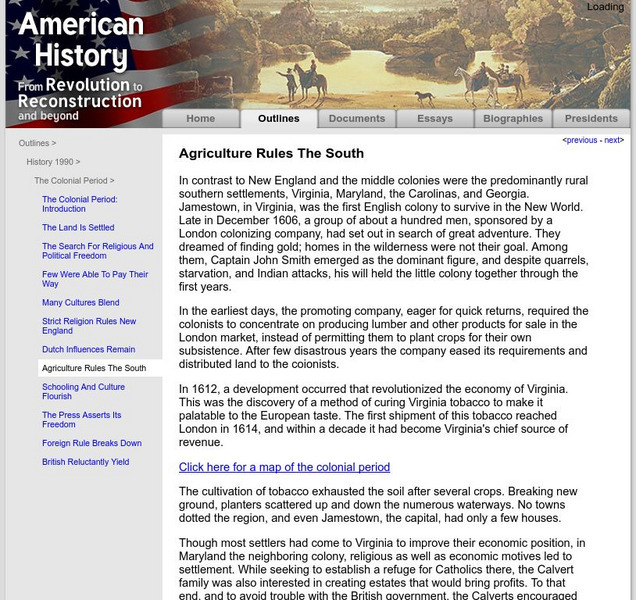University of Groningen
American History: Outlines: Basic Ingredients of the Us Economy
Every economic system tries to anticipate and then meet human needs through the production and distribution of goods and services. The economic system is the mechanism that brings together natural resources, the labor supply, technology,...
University of Groningen
American History: Outlines: The Era of Expansion and Reform
Outlines the period of United States history between the Civil War and World War I known as the Era of Expansion and Reform.
University of Groningen
American History: Outlines: Movement South and Westward
Following Eli Whitney's invention in 1793 of the cotton gin -- a machine that separated raw cotton from seeds and other waste -- the cotton market boomed. Planters in the South bought land from small farmers who frequently moved farther...
University of Groningen
American History: Documents: John Dickenson's Letter 2 From a Farmer 1767 1768
This letter, from a farmer in 1767, addresses his conceerns regarding the Townshend Duties and their effect on the colonies as a whole.
University of Groningen
American History: Essays: Colonization in Texas: Cultivation of Cotton and Wheat
Discusses the cotton economy in the Lower and Upper South of Texas in the 1800s, and the role transportation played in its growth, or lack thereof in some regions. Wheat was more widely grown in the Upper South where the yeomen farmed.
University of Groningen
American History: Outlines: Early American and Colonial Period to 1776
Background information about the literary traditions of the pre-Colonial and Colonial period. Includes information about Native American oral traditions and Native American cultures. Follow the links to the Early American era and to...
University of Groningen
American History: Essays: The Iron Horse: Ideology
From a lengthy essay on the history of the railroad in the United States. This section describes the role of townsite agents who, in addition to helping plan a town, acted as 'information brokers' to advise would-be merchants of the...
University of Groningen
American History: Biographies: Jacob Broom 1752 1810
Broom was born in 1752 at Wilmington, DE., the eldest son of a blacksmith who prospered in farming. The youth was educated at home and probably at the local Old Academy. Although he followed his father into farming and also studied...
University of Groningen
American History: Biographies: John Dickinson (1732 1808)
Dickinson has correctly been called the "Penman of the Revolution" by later historians. But his activities extended fortwo decades into the life of the new republic, years in which Dickinson's contributions were many. Dickinson's career...
University of Groningen
American History: Biographies: John Dickinson 1732 1808 (2)
Dickinson, "Penman of the Revolution," was born in 1732 at Crosiadore estate, near the village of Trappe in Talbot County, MD. He was the second son of Samuel Dickinson, the prosperous farmer, and his second wife, Mary (Cadwalader)...
University of Groningen
American History: Biographies: William Few 1748 1828
Few was born in 1748. His father's family had emigrated from England to Pennsylvania in the 1680s, but the father had subsequently moved to Maryland, where he married and settled on a farm near Baltimore. William was born there. He...
University of Groningen
American History: Biographies: Warren G. Harding
Warren Gamaliel Harding, twenty-ninth President of the United States, was born on November 2, 1865, on the family farm at Blooming Grove, Morrow County, Ohio. His parents were Dr. George Tryon Harding and Phoebe Dickerson Harding,...
University of Groningen
American History: Biographies: John Langdon 1741 1819
Langdon was born in 1741 at or near Portsmouth, NH. His father, whose family had emigrated to America before 1660, was a prosperous farmer who sired a large family. The youth's education was intermittent. He attended a local grammar...
University of Groningen
American History: Biographies: Charles Pinckney 1757 1824
Charles Pinckney, the second cousin of fellow-signer Charles Cotesworth Pinckney, was born at Charleston, SC, in 1757. His father, Col. Charles Pinckney, was a rich lawyer and planter, who on his death in 1782 was to bequeath Snee Farm,...
University of Groningen
American History: Biographies: Roger Sherman (1721 1793)
In 1723, when Sherman was 2 years of age, his family relocated from his Newton, MA, birthplace to Dorchester (present Stoughton). As a boy, he was spurred by a desire to learn and read widely in his spare time to supplement his minimal...
University of Groningen
American History: Outlines: Outlines: Clash of Cultures
Although brief, this discussion of the clash of cultures in the 1920s covers all the reasons for cultural discordance.
University of Groningen
American History: Outlines: Colonial Economy
Whatever early colonial prosperity there was resulted from trapping and trading in furs. In addition, the fishing industry was a primary source of wealth in Massachusetts. But throughout the colonies, people relied primarily on small...
University of Groningen
American History: Outlines: Nullification Crisis
Toward the end of his first term in office, Jackson was forced to confront the state of South Carolina, the most important of the emerging Deep South cotton states, on the issue of the protective tariff. Business and farming interests in...
University of Groningen
American History: Essays: Society After the Louisiana Purchase
Essay outlines events before and after the Louisiana Purchase from Jefferson convincing the French to cede New Orleans in 1803, to the expedition of Lewis and Clark in 1804.
University of Groningen
American History: Essays: Introduction: The u.s. And the Netherlands
Text introducing Dutch heritage and culture provides a cursory look at the impact the Dutch have had on the U.S.
University of Groningen
American History: Outlines: Machines and Science Help Farmers
Interresting site from the University of Groningen explaining the incredible impact of machines and technology on developing resources and improving agriculture.
University of Groningen
American History: Outlines: Agriculture Rules the South
The essay describes the devlopment of the Southern colonies as agricultural centers and the cultural aspects associated with rural, agricultural life.
University of Groningen
American History: Essays: Failure of West Indian Company Farming
Chronicles the begining of company farming in the United States and what led to its faliure. Click on "next" at the bottom of each page to get more of this essay. In-depth information.
University of Groningen
American History: Outlines: The Postwar Economy
An overview of America's economy in the decade and a half after World War II. Discusses the sources for this economic growth and the factors that impacted social and economic patterns.








